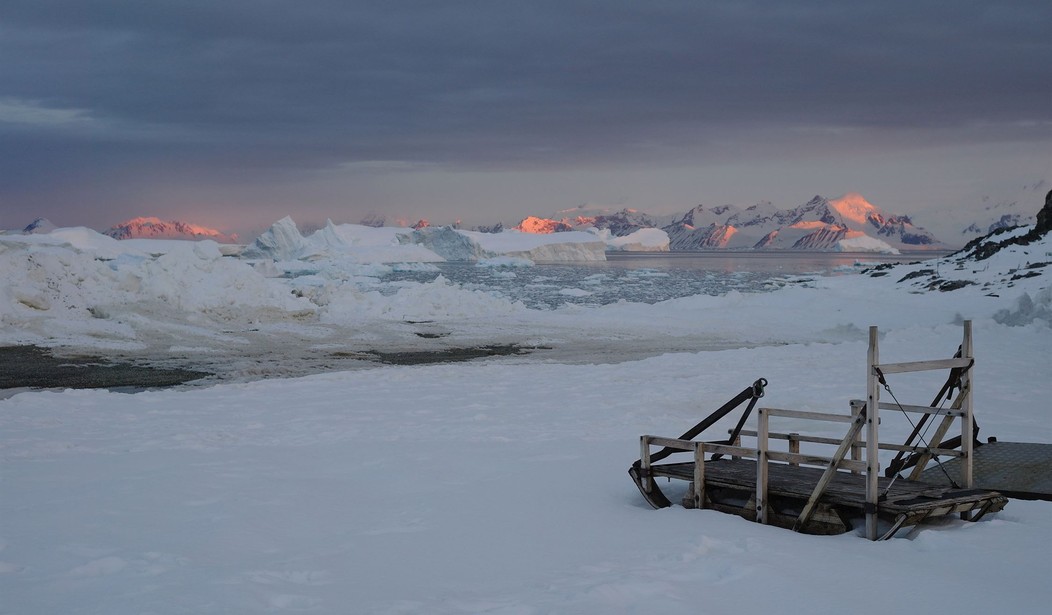New Study Finds Antarctic Sea Ice EXPANDING Since 1979

True story: 70 million years ago, in the late Cretaceous, Antarctica was covered mostly in temperate forest. Dinosaurs roamed the woods, and while the winters were still cold and the winter nights long, Antarctica was in those days green, not white.
These days, of course, that continent is the world's southern icebox. It's the only continent with no indigenous human population because it's a pretty forbidding place, surrounded by sea ice. That sea ice has been the subject of a lot of panicked screeching by climate scolds in recent years, as they claim that the ice is melting at an accelerating rate - but a new study described by The Daily Sceptic's Environment Editor Chris Morrison shows that the sea ice around Antarctica has actually been increasing since satellite monitoring began in 1979.
Sea ice around Antarctica has “slowly increased” since the start of continuous satellite recordings in 1979 with any changes caused by natural climate variation. In a paper published earlier this year, four environmental scientists further state that any sign that humans are responsible for any change is “inconclusive”. Not of course for mainstream media that have been crying wolf about the sea ice in Antarctica for decades to promote the Net Zero fantasy. Last year there was a reduced level of winter sea ice and this caused the Financial Times Science Editor Clive Cookson to exclaim that the entire area “faces a catastrophic cascade of extreme environmental events… that will affect climate around the world”.
Note the first sentence: "With any changes caused by natural climate variation." Yes, the climate changes. Yes, humans do have some effect - but our efforts, short of a full-scale global thermonuclear war, are a small part of it. Those changes are not sufficient to abandon our current technological lifestyle - or the abundant, affordable energy it requires.
There are variations, as there always have been, and some of them are surprisingly short-term when you consider the time scales on which the planet normally operates:
Over the satellite record, the scientists note there was a “prolonged and gradual” expansion of sea ice to around 2014 followed by a short period of sudden decline from 2014-19. Growth was then resumed, although there was a temporary downturn around 2022. These variations, which can also be observed before 1979, were caused by a number of natural atmospheric and oceanic factors. All of this is known of course, with the EU weather service Copernicus admitting recently that sea ice extent as a whole “shows large year-to-year variability and no clear long-term trend since 1979”. At the other end of the Earth, Copernicus correctly states that the cyclical decline in Arctic sea ice “has levelled off since 2007”.
In other words, it's not time to panic yet.
We may well spend another century getting a good handle on how Earth's climate really works. Plenty of folks whose horizons are bounded by city streets (and this is a little of my rural bias showing, I admit) have a hard time wrapping their heads around just how vast the Earth is, and the scope, scale, and complexity of the planet's climate. Our understanding of this huge, chaotic system seems to be about at the level of when humans thought the Moon was a light shining through a hole in the roof. But we are learning, year by year, how the planet's climate works, at least the broad strokes - and it sure seems like the more real, non-agenda-driven science is done, the less reason there is to run around screaming with our hair on fire about climate change.
See Related: STUDY: Errors in Temperature Measuring Wildly Inflate Warming Claims
Antarctic Ice Cores: Possible Evidence of Colonialism and Climate Change?
Mr. Morrison concludes:
Thoughts and prayers are also the order of the day for those who set great store in all the coral disappearing. Three years of record growth on the huge Great Barrier Reef put an end to that headliner. Polar bears are just as bad and keep breeding to top up new Arctic highs. Satellites keep discovering vast colonies of penguins in Antarctica, and mainstream media seem shocked into complete silence to report that the eyes in the sky have detected a vast recent plant greening of the Earth. There is a growing trend to debunk any ‘extreme’ weather claim – the great citizen journalist Paul Homewood even writes a book about the BBC’s more egregious climate howlers, every year no less, such is the volume to process.
The Net Zero project is starting to crumble around the world as citizens make their feelings known with votes, and sometimes with rocks. Nobody can or wants to live in a world without hydrocarbons. Crucial to this trend is an emerging understanding that the scientific process when it comes to climate has been trashed for decades and replaced with an increasingly laughable junk ‘settled’ science narrative.
In other words: Relax, and ignore the Chicken Littles. The sky is not falling. The Earth is not catching fire, and there's no need to rush to shut down all our coal and (especially) natural gas-powered generation plants. Although, if the green energy types were realistic, they would be advocating for clean, reliable, emissions-free nuclear power; they aren't, so that tells you how practical they really are.
You may view the entire original study here.
No comments:
Post a Comment